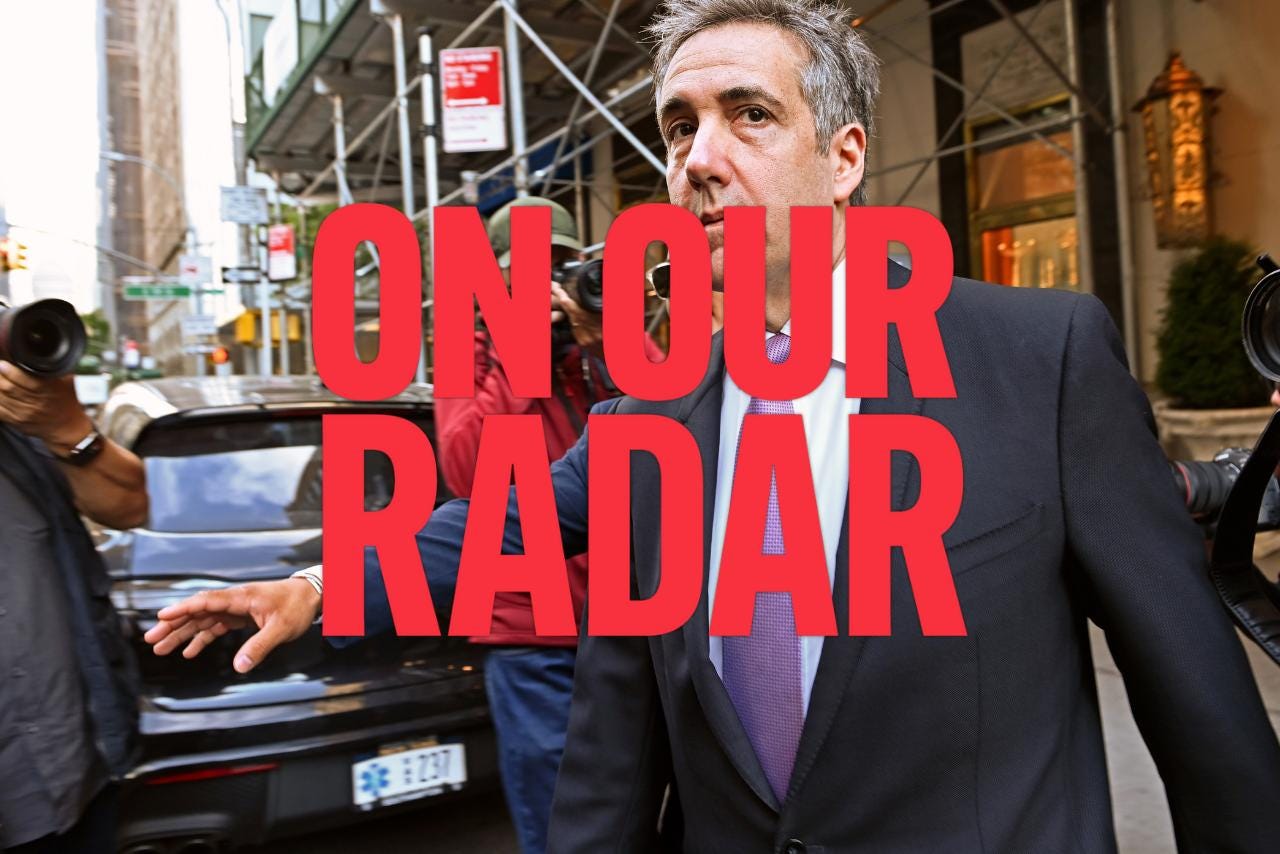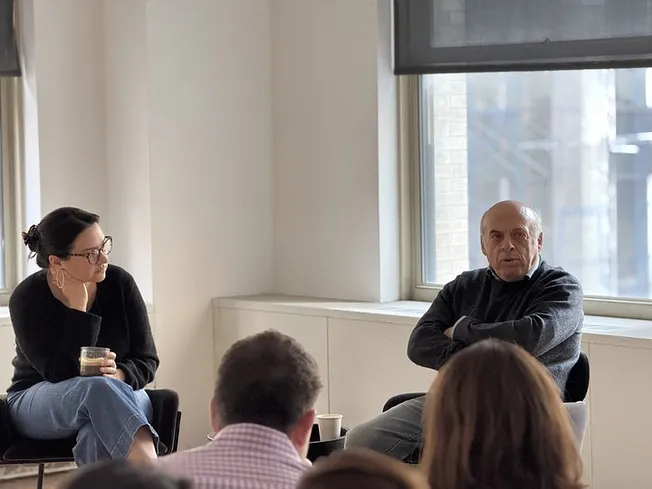On today’s Front Page from The Free Press: the many problems with the ICC case against Netanyahu, the Pope pontificates on American Catholics, and much more.
But first, one of our favorite explainers of the current moment: Martin Gurri. In today’s lead essay he shows how political forces across the world—including the trial against Trump, censorship in Brazil, and a populist backlash in Europe—are all leading to an “earthquake” that means “the political landscape could well be unrecognizable by 2025.” Here’s his brilliant piece, first published in Discourse, and reprinted here:
A fierce political conflict is raging over much of the democratic world. On one side we find the normies: ordinary people who defend, naively, the historic principles of democracy such as freedom of speech and assembly, the separation of powers, etc. On the other side stand the elites, masters of the great institutions of wealth, knowledge, and power, who insist that extraordinary measures must be taken to save a depraved and self-destructive society from its own history and its own people—that is to say, from the normies.
The elites are driven entirely by the impulse to control. They detest democracy, which keeps getting in their way, and much prefer a golden ideal they possessively call “Our Democracy”—their own rule in perpetuity. Individual rights are unfortunate legacies from a simpler era. The First Amendment, for example, they see as “hamstringing the government in significant ways.” By the way, that was Ketanji Brown Jackson talking, a Supreme Court justice whose job it is to defend the Constitution. Freedom of speech does hamstring government, that’s perfectly true—but only to the elites (who hate the sound of normie voices) is it a bad thing.
What is the conflict about?
The normies want to get on with life. They want to work, get married, have children—boring stuff. That’s what normal means.
The elites, for their part, wish to change everything: sex, the climate, our history, your automobile, your diet, even the straws with which you slurp your smoothie. For them there is no good and evil, no right and wrong, only oppressors and oppressed. Every transaction demands their intervention to protect designated oppressed groups. “Social justice” translates neatly into “elite control.”
The conflict rolls on around the world, undecided, and it’s the elites, it seems to me, who have that frightened, desperate look. Continue reading.
In the coming weeks there is a very good chance that Israel’s prime minister, Benjamin Netanyahu, will be pursued by the International Criminal Court as a wanted man. On Monday, the court’s chief prosecutor, Karim Khan, applied for an arrest warrant for Israel’s leader and its defense minister, Yoav Gallant.
That Netanyahu and Gallant’s warrant applications were announced alongside warrants for three Hamas leaders responsible for the October 7 massacre is the first of many flaws in this disgraceful case. Secretary of State Antony Blinken was right when he called the equivalence of Israel with Hamas “shameful.”
Then there’s the fact that Israel is not a party to the treaty that created the International Criminal Court, or ICC. Blinken said that “the United States has been clear since well before the current conflict that ICC has no jurisdiction over this matter.” Finally, Blinken noted “deeply troubling process questions.” Israel has said it was willing to cooperate with the court and that Khan had been due to visit Israel next week. Instead he abruptly announced his application for a warrant, which “call[s] into question the legitimacy and credibility of this investigation,” Blinken said.
But even assuming Khan is waging a credible, legitimate prosecution, there is another problem with the case. Khan’s central accusation against Israel is that the Jewish state has “intentionally and systematically deprived the civilian population in all parts of Gaza of objects indispensable to human survival.” That is a crime under international law. And Khan argues in a press statement that Israel has used “starvation of civilians as a method of warfare” to collectively punish Gaza’s 2.3 million people and to pressure Hamas to release the hostages it captured on October 7.
We have heard many accusations of starvation over the course of this war, but there has been scant evidence. (According to The Wall Street Journal, over the past seven months Hamas claims that 31 Gazans have died because of malnutrition and dehydration.) More, the ICC ignores abundant evidence that Hamas is hoarding the food and medical aid meant for the population it purports to govern. As the U.S. military was building a pier in Gaza to deliver aid last month, Hamas fired mortar rounds at the construction area. The Israel Defense Forces have posted many videos and photographs of Hamas gunmen commandeering aid from the United Nations Relief and Works Agency (UNRWA). On May 2, State Department spokesman Matthew Miller acknowledged that Hamas was diverting aid.
“Israel is letting the aid into Gaza,” an Israeli defense official who works closely on administering aid delivery into the territory told The Free Press. “But the aid is diverted by Hamas. We have lots of intelligence on how the aid only goes to Hamas members and their families.”
Nonetheless, international humanitarian organizations as well as the UN secretary-general claim that Israel has allowed Gazans to starve. Stephen Rapp, the former U.S. ambassador-at-large for war crimes issues in the Office of Global Criminal Justice under President Obama, told The Free Press he thought Israel’s case was hurt by Israeli extremist attacks against aid trucks entering Gaza. “They are being attacked by extremists,” Rapp said. “And I have not seen incidents of them being arrested.”
The failure of Israel to prosecute its own vigilantes weakens the country’s best argument before the International Criminal Court, Rapp said, but he still sees the prosecution as wrongheaded. “My general attitude is that this is a nation and system based on the rule of law. We count on them to investigate themselves; don’t take them to the Hague,” he said.
ICC prosecutor Khan also recommended arrest warrants for senior Hamas leaders who kidnapped, tortured, and murdered hundreds of Israelis, among other atrocities. But the fact that the prosecutor recommended the arrests for Israeli and Hamas leaders suggests that both parties are equal violators of international humanitarian law.
President Biden rebuked the court on Monday for making that parallel. “Let me be clear,” he said. “Whatever this prosecutor might imply, there is no equivalence—none—between Israel and Hamas.”
Is this suburban New York charity a terrorist front? The Westchester Peace Action Committee Foundation raked in more than $2.4 million in 2022 and spent nearly $1.5 million on “office expenses.” One tax expert suspects they are hiding where the money is really going. (Washington Free Beacon)
Julian Assange has won the right to appeal his extradition to the United States, where he would be tried for espionage. He successfully argued, in a UK court, that the justice system in the Land of the Free wouldn’t grant him the right to free speech. Last month, Rupa Subramanya wrote that Biden should drop the case altogether because “Julian Assange Gave America the Ugly Truth.” (Reuters)
The Trump trial doesn’t matter to voters. Just 13 percent say they are paying a “great deal” of attention to the case. (The Next America)
When Geert Wilders won the Dutch elections back in November, it was a shocking rebuke to the country’s political establishment. Months later, Wilders’ party has struck a deal to form a government. The coalition is a strange alliance of populists and liberals that could upend Europe’s moderate consensus. (UnHerd)
The death of Iranian president Ebrahim Raisi, a.k.a. The Butcher of Tehran, may have been met with fireworks and jubilation in Iran. But the U.S. State Department struck a more somber tone when it marked the passing of the regime’s number two, issuing “condolences.” Tehran says Death to America. Washington says Thoughts and prayers. (Department of State)
RIP to the real-life Gordon Gekko. Ivan Boesky, who became emblematic of 1980s Wall Street greed after he was convicted of insider trading, has died. (WSJ)
A new, lower-cost alternative to Wegovy (Ozempic for weight loss) is about to hit the market. The product, from Hims and Hers Health, Inc., isn’t exactly cheap at $199. But it’s less than an Equinox membership at least. (Bloomberg)
Jerry Seinfeld was heckled by an anti-Israel protester at a recent stand-up gig. The crowd booed the heckler, and Seinfeld quipped, “I like it when the Jew-haters spice up the show.” (Fox News)
“Turning to Twitter, I channel-surf other brains before consulting my own.” You will recognize Daniel Schillinger’s description of waking up and immediately going on your smartphone—and you will also be horrified by it. (The Point)
“Puzzling” is reportedly all the rage among Gen Z. I don’t want to be the old guy complaining about the kids these days, but is this really what they’re doing instead of drinking and getting laid? Playing Wordle and doing crosswords? (Dazed)
Here at The Free Press we’ve argued that Jews should not compromise their values in the face of exploding antisemitism post–October 7. Free speech should still be nonnegotiable. The whole DEI apparatus should be seen as part of the problem—not the solution.
But in today’s Free Press, Sarah Rose Siskind suggests that maybe that’s wrong. Maybe grievance politics is the answer. Maybe—hear us out here—it’s time to Apply the Social Justice Playbook to Jews. Do not miss her entirely serious, not at all satirical guide for how to be a good ally to the Jews.
→ I stole from the Trump organization, says Michael Cohen: Prosecutors rested their case against Donald Trump in the hush money trial in New York on Monday. It was also the last day on the stand for their star witness, Michael Cohen. The credibility of the former Trump lawyer—a convicted felon—was always going to be a problem for the prosecution. And, by all accounts, it proved so during cross-examination on Monday when Cohen admitted to stealing tens of thousands of dollars from the Trump organization. As CNN legal analyst Elie Honig noted, that is a “higher degree of a felony than what Donald Trump is charged with. Yet they gave Michael Cohen a free pass. . . . It goes to his credibility, it goes to his relationship with the DA.”
Not great! But also, this is not even the biggest problem with the case. Its fatal flaw, as Eli Lake argued in The Free Press last week, is the charge that Trump falsified business records in the aid of committing another crime. Here the prosecution has been forced to get creative with arguments about federal election laws. So, regardless of Cohen’s reliability as a witness, the case against Trump is on very shaky ground indeed.
→ The Pope pontificates on American Catholics: It seemed like the Vatican was gaining back credibility among its more traditional followers last month when it released a twenty-page document called “Infinite Dignity” that came down hard against things like surrogacy and abortion.
But then Pope Francis went on 60 Minutes this weekend. While he denied that he allows for the blessing of same-sex couples, when Norah O’Donnell asked him to respond to conservative bishops in the states who oppose his social progressivism, the Pope laughed. “Conservative is one who clings to something and does not want to see beyond that. It is a suicidal attitude,” he said. He warned against getting “closed up inside a dogmatic box” and the “globalization of indifference.”
Pope Francis also called the closing of America’s southern borders “madness,” prompting those same conservative Catholics to call the Pope a “social justice advocate,” a “manifest heretic,” and a “Marxist.”
Last year, I spent some time with some of these anti-Pope Catholics at the Conference for the Coalition of Canceled Priests, where Francis was referred to as a “viper” and an “anti-pope” who has it out for the Traditional Latin Mass. At this point, there’s probably zero hope the Pope will win over Catholics who think the church ought to roll back Vatican II. But one wonders: Who exactly is the Pope preaching to? For a defense of Francis, read this and this. —Suzy Weiss
→ Censorship of the British “baby killer”: Lucy Letby murdered seven babies. Or at least, the former NHS nurse was convicted last August of murdering them, after one of England’s longest ever murder trials. But her case could make history again—as one of the biggest miscarriages of justice in British history. Last Monday, The New Yorker published a story that very credibly argues she should not have been found guilty. The trouble is, no one in the UK is allowed to read it.
I am writing from London, where anyone who clicks the article gets an awkwardly jaunty redirect notice. When I first saw it, I assumed it was a mistake, but then rumors started to fly that it had been “geo-blocked” in the UK—later confirmed by a statement from the magazine, which blamed a “court order restricting press coverage of Lucy Letby’s ongoing trial.”
With the Streisand effect in full force, Brits fired up VPNs and set their virtual locations to random American towns. Thirteen thousand words later, it seemed possible that Letby could have been one more conscientious but chronically overwhelmed nurse in our crumbling National Health Service being blamed for failures that weren’t hers. The prosecution leaned heavily on the fact that Letby was present for a disproportionate number of unexpected infant deaths—giving in to a well-known statistical fallacy. (What if she was just always asked to look after the sickest babies because she was the best nurse? One of her colleagues actually said her colleagues would “thank God” when she arrived, “because she’s really good in a crisis.”)
Why was the story blocked for UK readers? Because in Britain there’s a complete ban on any media activity that can prejudice a jury—and Letby is awaiting the retrial of one charge. In Letby’s case, the judge granted an “unusual” number of additional reporting restrictions. Journalists covering the trial described it as “extremely difficult for people to follow.” But it was easy to demonize Letby, to call her a “baby killer” in headlines, as long as it was in quotation marks, or after the word alleged.
If there’s one thing Letby’s defenders and detractors agree on, it’s that Brits deserve to know more about the case. Last week, a Member of Parliament argued that the block on the New Yorker story—which he said raises “enormous concerns” about her conviction—exists “in defiance of open justice.” Meanwhile, a lawyer representing the families of Letby’s victims said that “grossly offensive” conspiracy theories about the case were “distressing,” and compared his clients to the relatives of American school shooting victims. His solution feels American, too: he recommended that proceedings be livestreamed. —Freya Sanders
→ Doctor sings new tune on social distancing: The nation’s top public health official during the Covid pandemic now admits he saw no evidence justifying the six-feet social distancing rule. He made the admission in closed-doors testimony earlier this year. So what was then–NIH director Dr. Francis Collins doing back in early 2020? Rather than searching for scientific evidence for the stringent new guidelines, he was singing a song—to the tune of “Puff, the Magic Dragon”—about the benefits of the decree in a video still on the National Institutes of Health’s YouTube channel. This footage was brought to our attention by friend of The Free Press, Dr. Vinay Prasad, who says in a new video that “Instead of writing a song. . . Collins should have been talking to scientists who disagreed with him.” Meanwhile, it’s clips like this that have me wondering: Did 2020 actually happen? Or was it just a weird dream?
→ Raisi’s “mixed” legacy: Speaking of things I can’t believe actually happened, here’s the BBC’s take on The Butcher of Tehran:
On the one hand, a lot of torturing and murdering of dissidents. On the other, and I wish I were making this up, “some reform in processing a backlog of court cases.” Tough to know how to weigh those against one another.
Yohanna recommends Chilean Peach Sangria: My husband and I like to drink it on our deck on hot afternoons. We call this routine our “sangria ritual.” The recipe is a bottle of Chilean sauvignon blanc, 2 tablespoons white sugar, 2 cups sparkling water, and as many sliced peaches, fresh or frozen, as you want. Mix everything together, and chill for a few hours. Serve over ice.
This commencement season, Cathy recommends David Foster Wallace’s 2005 speech at Kenyon College, “This Is Water.”
Oliver Wiseman is a writer and editor for The Free Press. Follow him on X @ollywiseman.
To support The Free Press, become a paid subscriber today:
And if you’re enjoying The Front Page, consider forwarding it to someone else you think might like it.


















our Comments
Use common sense here: disagree, debate, but don't be a .